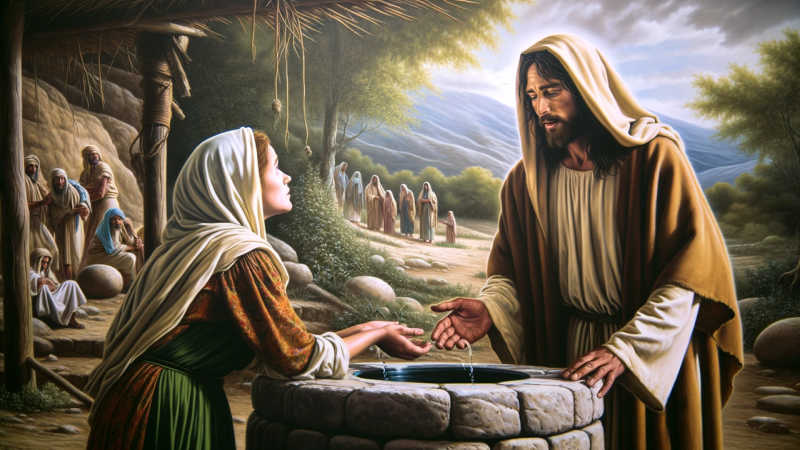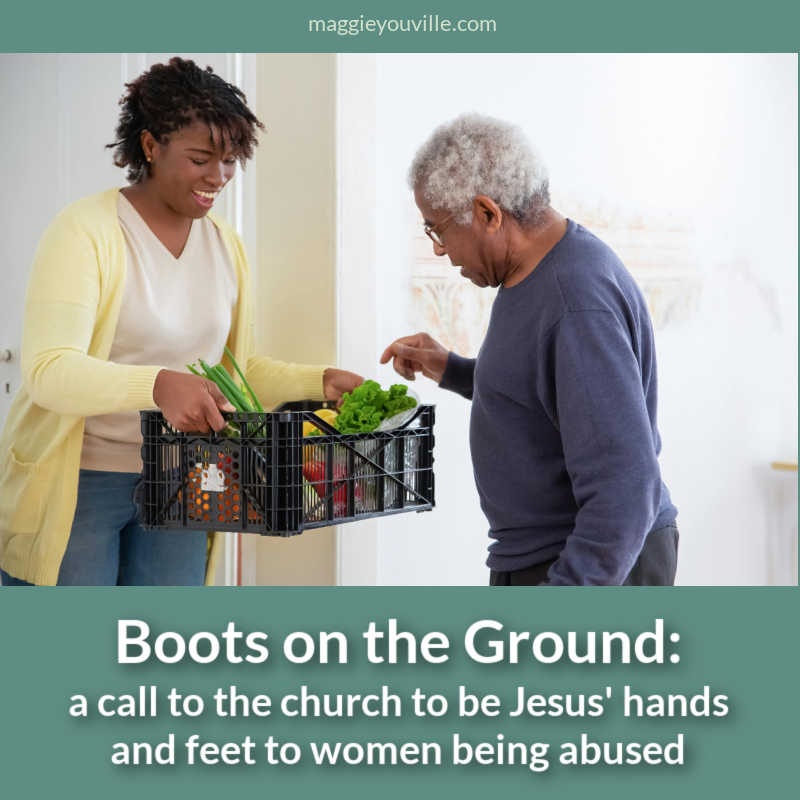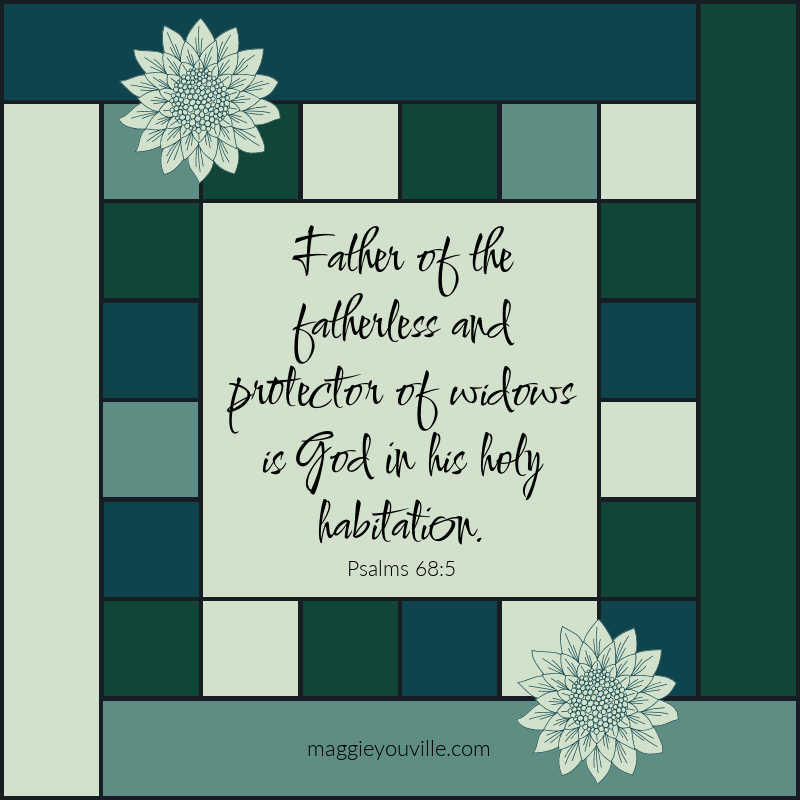I stared at the three light bulbs above my bathroom mirror. When my hand thumped against the wall, all three lights flickered. Was this just a minor problem like my brother thought or a possible fire hazard like my friend Gary thought?
I’d done a lot of repairs around my home over the past three years, as a single mom living in a fixer-upper, but I’d never tackled electrical problems before. Somehow there seemed to be a bigger margin for error in painting than wiring. I wished Gary could come do this job for me, but he lived 6000 km away and was diagnosing the problem based on my email to him.
Gary apparently sensed my hesitation over this, as he sent a message to our mutual friend, John, who lived near me, saying, “I need boots on the ground here. Can you help Maggie fix her bathroom lights?”
John was more than happy to help. That weekend, we stood in my tiny ensuite bathroom, removing the light fixture. Even without any knowledge of electrical things, it was obvious to me the wiring here was badly done—and definitely a fire hazard. With John’s help, I carefully sorted through the tangle of multi-colored wires, attached them in the right places, and installed a new light fixture.
The next weekend, John was back to help with the other bathroom, which had a similar old, badly wired light fixture. With a friend beside me to walk me methodically and carefully through removing and re-installing a bathroom light, the job became easy.
Boots on the Ground in the Church
In our Christian walk, we often need “boots on the ground”—concrete, physical help during times of stress, pain, and need. Jesus himself was boots on the ground in Palestine, walking among the ordinary people of his day to feed and heal them and meet their very human needs. And yet too often, when a friend tells us she is struggling or suffering, we say, “I’ll pray for you” and leave it at that.
Prayer is not enough. As James reminds us in his epistle,
If a brother or sister is naked and destitute of daily food, and one of you says to them, “Depart in peace, be warmed and filled,” but you do not give them the things which are needed for the body, what does it profit? Thus also faith by itself, if it does not have works, is dead.
(James 2:15-16)
Many of the problems we face today seem insurmountable. We can’t stop a friend’s husband from abusing her. We can’t cure a friend’s cancer diagnosis. We can’t bring back a missing loved one. But we can still be boots on the ground, walking with our friends through that suffering. We can offer practical, loving support the way Jesus did when he walked on earth.

There are numerous ways we can help those in our parish who are facing a difficult season, including a woman facing abuse, separation, or divorce:
- bring meals (or organize a meal train) so she doesn’t have to think about cooking or food while she is dealing with huge emotional burdens.
- offer childcare so she can rest or focus on her own healing and wellness or attend appointments and lawyer’s meetings
- listen when she needs to talk about her struggles, her grief, her trauma, without trying to defend her abuser, minimize her feelings, or solve her problems.
- check in with her regularly so she knows she is loved.
- help her meet any financial needs, such as groceries, legal fees, or utility bills.
Churches and parish staff should also help connect single moms with other resources and organizations that can help them, such as St. Vincent de Paul groups. Parishes can offer bursaries or financial assistance for low-income families who send their kids to Catholic schools. Parishes who cannot directly support single moms should have a list of local organizations that will offer concrete assistance, including financial help, therapy, childcare, food support, and more.
Physical Help Can Be Emotionally Healing
Such practical support often meets not just physical needs for the struggling woman, but also emotional and spiritual needs. Abuse often makes a woman think she is unlovable, unworthy, unseen, unheard, useless, failing, and more. She has likely been told to do more or try harder, even when she’s doing everything she can. She may be afraid to ask for help, because asking for help from her abuser was dangerous. Being offered help, being seen and heard by those around her, being told she doesn’t need to keep worrying and striving, can be deeply healing for her.
Anna* said, “The first time I confided I was struggling with basic needs and worried to my priest, he took a $100 bill from his desk and said, ‘I wish I could do more right away. I can talk to the Knights of Columbus.’ To not be treated like a number, or a screw up, or given advice on how to stretch $$ for frugal groceries, but just taken seriously and helped immediately… I put my head down and wept from relief and gratitude.”

Mercy added, “Parishioners often approach me to ask how *I* am doing. Not just us as a family. They offer help whenever I express struggle and many times, I have been given a card with cash in it as an unexpected gift. My parish family has been a godsend to me.”
“My local Catholic homeschool group set up a meal train for me after I shared that I had separated from my husband,” Josie remembers. “One woman drove over an hour to drop off a big box of Hello Fresh meals for her. I knew her face, but I couldn’t remember her name. My kids came into the kitchen and asked, ‘Who brought us food tonight?’ and I had to say, ‘I don’t know.” I just stood there crying. Someone who barely knew me cared enough to help me at a time when I was struggling to meet our basic needs. I’ll never forget that.”
Jody says, “My pastor was amazing. He gave me a job when I told him I didn’t think I was appropriate to be working for the church. He buffered me from nosy parishioners and told them to mind their own business. He was such a compassionate place for me to go when I was just spinning in confusion. He even came one evening to talk to my daughters and back me up about the kind of help I needed in the home and how we could work together as a family. And our first Christmas he gave me a stack of gift cards and cash, including for groceries, gas, shopping, etc. It was from the parish. Probably around $1000 at least. I didn’t know how to accept that generosity.”
Another parishioner also offered Jody support from a very personal place: “A lady from the Parish who had gone through her own divorce about 18 years before mine invited me for dinner and asked if a service group she was with (not Catholic based) could adopt our family for Christmas. We had so many beautiful gifts from the generosity of that service group. And that moment was healing because 18 years prior I had judged that woman for what she did. This gave me an opportunity to ask for forgiveness, even though she didn’t know the judgement that was in my heart. On the other side of the story, I understood so much more. I remember the look of disbelief in my children’s eyes as they saw people come to our help. I know that made a huge impression on them.”
The Modern-day Widow
Throughout the Old Testament, we read stories of widows and God’s heart for widows and orphans. In the ancient world, when women were considered property, a women’s well-being depended on the men in her life. If she had no father or husband to protect her, then she was basically destitute. Over and over again, God calls his people to protect and help these women.
In the laws given to the Israelites in Exodus, God says, “You shall not mistreat any widow or fatherless child. If you do mistreat them, and they cry out to me, I will surely hear their cry, and my wrath will burn.” (Exodus 22:22-24 ESV)
In Deuteronomy, God commands his people to leave something for the poor during the harvest: “When you reap your harvest in your field and forget a sheaf in the field, you shall not go back to get it. It shall be for the sojourner, the fatherless, and the widow, that the Lord your God may bless you in all the work of your hands. When you beat your olive trees, you shall not go over them again. It shall be for the sojourner, the fatherless, and the widow.” (Deuteronomy 24:19-20 ESV)
Later in the Bible, Ruth (a young widow caring for her widowed mother-in-law) takes advantage of this law to gather grain for them. While doing so, she meets her future husband Boaz and becomes part of Jesus’ lineage. Her story is a story not just of trust and prayer, but action. Ruth puts her love for her mother-in-law into her deeds, and in doing so, catches Boaz’s attention, who also puts boots on the ground for her, offering her not just the leavings from his fields but also his protection.

The psalmist says, “Father of the fatherless and protector of widows is God in his holy habitation” (68:5) and “The Lord watches over the sojourners; he upholds the widow and the fatherless, but the way of the wicked he brings to ruin” (146:9). The prophet Isaiah admonishes his people, “Wash yourselves; make yourselves clean; remove the evil of your deeds from before my eyes; cease to do evil, learn to do good; seek justice, correct oppression; bring justice to the fatherless, plead the widow’s cause” (1:16-17).
Job boasts of how he has helped widows from his youth. Elijah rescues a widow from starvation and raises her son from the dead. Jesus raises the only son of a widow, who would be left destitute without his support. All of these readings reiterate the need for the church to provide help in meeting daily, physical needs of those suffering from loss and going through times of transition.
Offer Compassion, Not Judgement
Today, while there are still women who suffer widowhood, women are more likely to face the loss of a husband through divorce than through death. However, women who are widowed are more likely to receive help and sympathy from the church than women who are divorced. Our churches need to stop making judgement about how a woman becomes a single mom and simply offer to meet her needs, whatever those needs are.
In one support group for women seeking healing from abuse, numerous women shared the pain of being judged and abandoned by their parishes while they went through the pain of divorce. “I was ostracized, denounced, and publicly humiliated. It’s been 2 years and I’m still so hurt,” said Abby.
This sense of rejection was felt not only by the women themselves, but by their children as well. Marian said, “I can’t tell you how many times I reached out to people at our parish who had children my daughter’s age, practically imploring them to include my daughter in activities, and was declined. My daughter is very social and has suffered intensely from the alienation we received at the hands of our co-religionists.”
Betty added, “There were a handful of people who were super kind during my divorce. But I have to add a similar story. In general, I felt so unwelcome. My daughter was supposed to start confirmation classes, but no one ever called back about our registration, in spite of numerous calls. I finally gave up.”
Anna said, “Also just generally being excluded from the dinner invites—maybe because I didn’t have a husband for the man to talk to, or maybe because they were afraid I could be a home wrecker or a bad influence on their children for divorcing? Or maybe just because I couldn’t afford to invite them back? Some people stepped up, others stepped back, you know? More of the quiet quitting than the solidarity and support though.”
But someone will say, “You have faith and I have works.” Show me your faith apart from your works, and I will show you my faith by my works. You believe that God is one; you do well. Even the demons believe—and shudder! … For as the body apart from the spirit is dead, so also faith apart from works is dead.
James 2:18-26
The Good Samaritan
Most of us are familiar with the story of the Good Samaritan. A man is attacked by travelers and left bleeding and hurting on the side of the road. First a priest, then a temple assistant passes by the man without offering any help. Finally, a man from another country comes along. He brings the wounded man with him to a nearby inn, where he pays for the man’s care. Jesus used this story to illustrate what a good neighbor is, but the story is also a scathing rebuke of those who passed the man by without offering help.
Many women who have walked through abuse, separation and divorce have received more support, empathy, and protection from secular sources than from Christian or Catholic sources. When the church fails to have boots on the ground, to love as Jesus loved, to help as the Good Samaritan did, people are deeply hurt. Too often, instead of offering healing, churches simply exacerbate the abuse that a woman has walked through.
Josie said she’s often felt like that traveler on the side of the road, broken and bleeding, watching while familiar faces turned away from her and walked on. With open wounds, she begged for help, only to have those wounds re-opened and re-injured by the responses she got from those who could have or should have helped her.
Churches need to be places of compassion, welcome and care. Priests and parish staff should be abuse-informed; they should know how to help a woman who comes to them with questions about why her husband treats her so badly. And as members of the church, we need to be people who extend love rather than judgement, who welcome others no matter how they show up in our parishes, and who have our boots on the ground to spread God’s love to those who need it most.
*Names changed to protect the privacy of the women who shared their stories for this article.
Leave a Reply